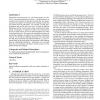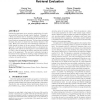499 search results - page 5 / 100 » Search Engines that Learn from Implicit Feedback |
AIRS
2006
Springer
14 years 5 days ago
2006
Springer
Search Engines today often return a large volume of results with possibly a few relevant results. The notion of relevance is subjective and depends on the user and the context of ...
CIKM
2005
Springer
14 years 1 months ago
2005
Springer
Information retrieval systems (e.g., web search engines) are critical for overcoming information overload. A major deficiency of existing retrieval systems is that they generally...
SIGIR
2010
ACM
14 years 9 days ago
2010
ACM
Interleaving experiments are an attractive methodology for evaluating retrieval functions through implicit feedback. Designed as a blind and unbiased test for eliciting a preferen...
WISE
2000
Springer
14 years 24 days ago
2000
Springer
In this paper we report our research on building WebSail { an intelligent web search engine that is able to perform real-time adaptive learning. WebSail learns from the user'...
SIGIR
2004
ACM
14 years 1 months ago
2004
ACM
We investigate how users interact with the results page of a WWW search engine using eye-tracking. The goal is to gain into how users browse the presented abstracts and how they s...


